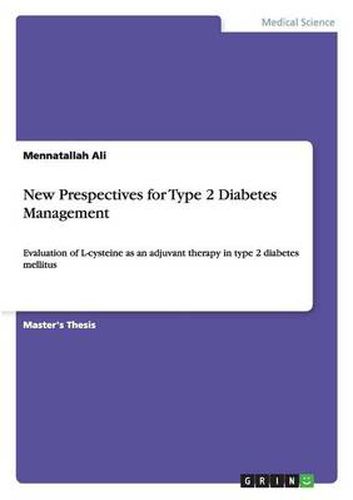Readings Newsletter
Become a Readings Member to make your shopping experience even easier.
Sign in or sign up for free!
You’re not far away from qualifying for FREE standard shipping within Australia
You’ve qualified for FREE standard shipping within Australia
The cart is loading…






Master’s Thesis from the year 2012 in the subject Medicine - Therapy, grade: A, University of Alexandria (Medical Research Institute - Alexandria University), language: English, abstract: Increasing evidence has established causative links between obesity, chronic inflammation and insulin resistance; the core pathophysiological feature in type 2 diabetes mellitus. This study was designed to examine whether the combination of L-cysteine and metformin would provide additional benefits in reducing oxidative stress, inflammation and insulin resistance in streptozotocin-induced type 2 diabetes in rats. Male Wistar rats were fed a high-fat diet (HFD) for 8 weeks to induce insulin resistance, after which they were rendered diabetic with low-dose streptozotocin. Diabetic rats were treated with metformin (300 mg/kg/day), L-cysteine (300 mg/kg/day) and their combination along with HFD for another 2 weeks. Control rats were fed normal rat chow throughout the experiment. At the end of treatment, fasting blood glucose, fasting serum insulin, homeostasis model assessment-insulin resistance index (HOMA-IR) and serum free fatty acids (FFAs) were measured. Serum levels of the inflammatory markers; monocyte chemoattractant protein-1 (MCP-1), C-reactive protein (CRP) and nitrite/nitrate were also determined. The liver was isolated and used for determination of malondialdehyde (MDA), reduced glutathione (GSH), caspase-3 and cytochrome c levels. The hypoglycemic effect of the combination therapy exceeded that of metformin and L-cysteine monotherapies with more improvement in insulin resistance. All treated groups exhibited significant reductions in serum FFAs, oxidative stress and inflammatory parameters, caspase-3 and cytochrome c levels compared to untreated diabetic rats with the highest improvement observed in the combination group. In conclusion, the present results clearly suggest that L-cysteine can be strongly considered as an adjunct to metformin in management of type 2 diabet
$9.00 standard shipping within Australia
FREE standard shipping within Australia for orders over $100.00
Express & International shipping calculated at checkout
Master’s Thesis from the year 2012 in the subject Medicine - Therapy, grade: A, University of Alexandria (Medical Research Institute - Alexandria University), language: English, abstract: Increasing evidence has established causative links between obesity, chronic inflammation and insulin resistance; the core pathophysiological feature in type 2 diabetes mellitus. This study was designed to examine whether the combination of L-cysteine and metformin would provide additional benefits in reducing oxidative stress, inflammation and insulin resistance in streptozotocin-induced type 2 diabetes in rats. Male Wistar rats were fed a high-fat diet (HFD) for 8 weeks to induce insulin resistance, after which they were rendered diabetic with low-dose streptozotocin. Diabetic rats were treated with metformin (300 mg/kg/day), L-cysteine (300 mg/kg/day) and their combination along with HFD for another 2 weeks. Control rats were fed normal rat chow throughout the experiment. At the end of treatment, fasting blood glucose, fasting serum insulin, homeostasis model assessment-insulin resistance index (HOMA-IR) and serum free fatty acids (FFAs) were measured. Serum levels of the inflammatory markers; monocyte chemoattractant protein-1 (MCP-1), C-reactive protein (CRP) and nitrite/nitrate were also determined. The liver was isolated and used for determination of malondialdehyde (MDA), reduced glutathione (GSH), caspase-3 and cytochrome c levels. The hypoglycemic effect of the combination therapy exceeded that of metformin and L-cysteine monotherapies with more improvement in insulin resistance. All treated groups exhibited significant reductions in serum FFAs, oxidative stress and inflammatory parameters, caspase-3 and cytochrome c levels compared to untreated diabetic rats with the highest improvement observed in the combination group. In conclusion, the present results clearly suggest that L-cysteine can be strongly considered as an adjunct to metformin in management of type 2 diabet